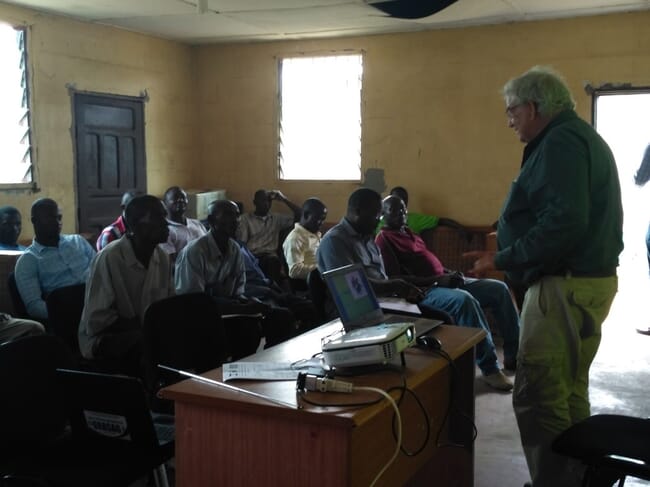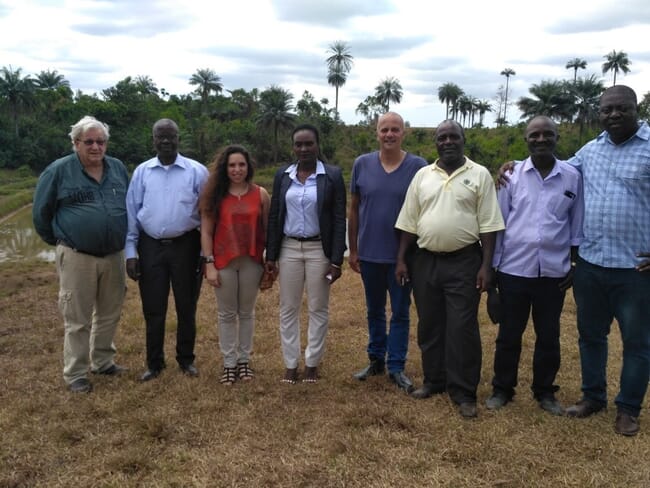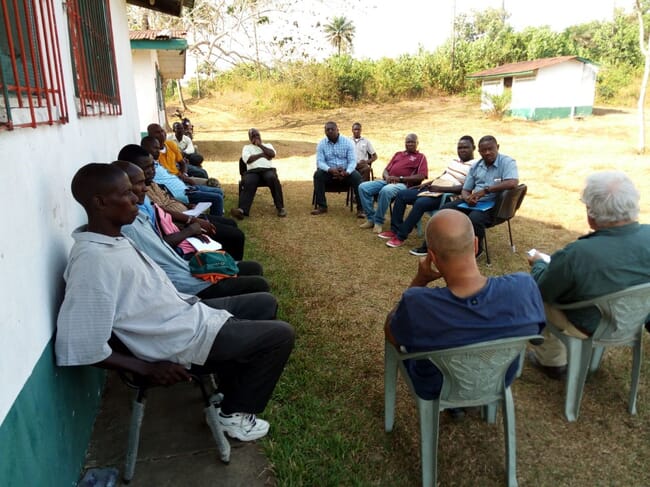The World Bank-sponsored West Africa Regional Fisheries Project (WARFP) aims to inspire nine countries, from Mauritania to Ghana, to recover from the drastic over-exploitation of their rich fisheries resources, and to enhance food security by optimising fish production.
The bulk of the US$14 million obtained by Liberia under the project has gone into strengthening fisheries governance institutions, but the government has been collaborating with other partners to promote aquaculture production too.

Like the other countries covered by WARFP, fish resources along Liberia’s 570km coastline have been drastically reduced by illegal, unreported and unregulated (IUU) fishing, mostly by large foreign vessels. Current IUU catches are estimated at $75 million per year. In spite of her rich fisheries endowments, Liberia imports 50,000 tonnes of fish annually. The WARFP project is expected to enable the country restore fish production over the long term.
Current aquaculture production is very low, approaching 1,000 tonnes a year. Nearly all of this output is down to the country’s 300 or so micro-scale fish farmers, who work on a total of 1,700 ponds, covering a total of 114 hectares. But aquaculture is seen as having the capacity to help increase domestic production in the next few years, and to help achieve a substantial rise in annual fish consumption from the current 5kg per capita. Among the natural conditions that favour aquaculture production in Liberia is the abundance of water all year round and the compact texture of the soil, with a 75 percent latosol content which enhances water retention.
Liberia’s Fisheries and Aquaculture Policy and Strategy (2014) aimed to increase aquaculture production to 15,000 tonnes by 2030. But recent pronouncements and projections by government officials indicate a desire to achieve a higher figure, before that date. The managing director of the National Fisheries and Aquaculture Authority (NAFAA), Emma Mieteh Glassco, recently expressed displeasure that – in spite of its long coastline and extensive inland water resources – Liberia currently imports 80 percent of the fish consumed domestically. And she promised to ensure that aquaculture would plug the supply gap.
“There are a lot of opportunities to grow the sector,” she said .
Following a request to the Israeli government and the signing of an aquaculture cooperation programme, two Israeli aquaculture experts have conducted a survey of Liberia’s aquaculture sector , under the umbrella of Israeli government development agency MASHAV, which is expected to guide further activities. They also have run a training programme for fish farmers, aquaculture technicians and extension workers.

According to MASHAV’s coordinator for Ghana and Liberia, Dana Chocron, the current focus is on training and capacity building. However, upon request, cooperation could also extend to other areas. Liberian fisheries officials are hopeful that the availability of high-level Israeli expertise will result in a substantial rise in aquaculture production, and help create meaningful employment for many of Liberia’s unemployed.
The United Nations Mission in Liberia (UNMIL) has also weighed in on the effort to improve aquaculture. UNMIL, which played a key role in restoring and maintaining peace in Liberia after the devastating civil war that ravaged the country from 1989 to 1999 , is also playing a role in the restoration of economic activity, especially in addressing unemployment and food security. As part of its Quick Impact Project for the fisheries sector, UNMIL recently sponsored three officials from the National Fisheries and Aquaculture Authority to attend a training programme at one of Ghana’s major fish farms, Flosell. The programme was focused on tilapia production, and was intended to strengthen the NAFAA in its development of aquaculture in Liberia.
West African context
With effective training of farmers and extension workers, Liberia should be able to maximise aquaculture production in good time, while minimising the inefficiencies which have characterised aquaculture production in other African countries, especially Ghana and Nigeria. Although many observers regard Ghana and Nigeria’s current annual aquaculture output of 50,000 tonnes and 316,000 tonnes respectively as impressive, production on the many small-scale fish farms is very low, due to the dearth of effective management practices. A handful of big foreign-owned firms accounts for the vast majority of the current output.

Fortunately, some efforts are being made to address these shortfalls. In Ghana, a training programme for small-scale pond and cage farmers is being undertaken by the Aquaculture Research and Development Centre under the West African Regional Fisheries Project, with the hope of imparting vital skills to fish farmers. And in Nigeria, Skretting and Aller Aqua are among the increasing number of foreign aquaculture firms that are rolling out training programmes for fish farmers as a means of expanding their markets for fish feed and other inputs.
Ms Chocron told The Fish Site that while there is currently no collaboration programme between Ghana and Israel, MASHAV was willing to make Israeli expertise available to aquaculture experts and practitioners. “We are ready to consider any proposals that will be forthcoming from government,” said Chocron.
Ghana and Israel signed an agreement in November 2006 on cooperation in aquaculture and fisheries research. Recently, Israeli tilapia research findings have featured in discussions among fisheries officials. Ghana’s government has since appointed a committee to review restrictions on the importation of “alien” tilapia species, and it is expected that significant changes will be made.



